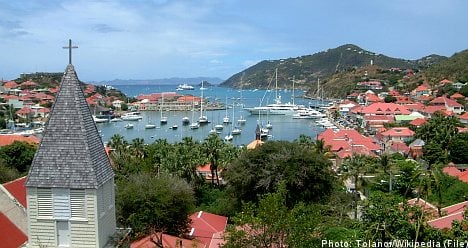Earlier this week, a commission by regional governments to look into seeking reparations for "native genocide, the transatlantic slave trade and a racialized system of chattel slavery", identified Sweden as one of eight European countries that should "address the living legacies of these crimes."
Other countries named by the Caribbean Community Reparations Commission, which was launched earlier this year, included Britain, France, Spain, Portugal, the Netherlands, Norway, and Denmark.
While the Swedish foreign ministry has been following the commission's work, diplomats were unaware that Sweden would be named until this week's announcement in Jamaica on Tuesday.
"We didn't know Sweden was going to be included when the commission started," Claes Hammar, Sweden's ambassador to the Caribbean told The Local.
While Sweden may not immediately spring to mind as a Caribbean colonial power, the Swedes acquired the island of St. Barthélemy from Britain in 1784.
Sweden established Gustavia, the capital, as a free port, helping boost trade with the 22-square kilometre island. But slavery was also practiced on the island until 1847.
Sweden's colonial presence ended in 1877, however, when the island was handed over to France.
While Hammar characterized Sweden's colonial activities as "marginal" compared to other more prominent European powers active in the Caribbean, he didn't dispute that Caricom, as the reparations commission is known, was justified in looking at Sweden along with other colonial powers.
"I'm not totally surprised. Sweden did after all have a colony in the Caribbean so it's not wrong for us to be a part of the discussion," he said.
"This is a serious matter and we have to have respect for the process."
He emphasized that Sweden had yet to take an official position on whether or not it would offer slave trade reparations to Caribbean countries and likely wouldn't take any concrete steps before Caricom issued its findings, expected in February.
However, Hammar said Sweden is "certainly open to looking at possibilities" for compensating countries in the region.
"The question is what sort of compensation could be offered. There are no survivors from that period, only their descendants," he said, mentioning aid with education or other social welfare programmes were possible options.
Sweden will also likely confer with other countries under review by Caricom. The matter will also be reviewed by the foreign ministry's human rights division, Hammar explained.
Caricom has solicited the services of a British law firm that helped gain compensation for Kenyans who claimed they were tortured by the British colonial government.
The commission has identified six areas related to conditions in the Caribbean, including inadequate public health and education, as well as "scientific backwardness" that they believe are a "direct result" of colonial-era crimes and should be the focus of "reparatory diplomacy and action".


 Please whitelist us to continue reading.
Please whitelist us to continue reading.
Member comments